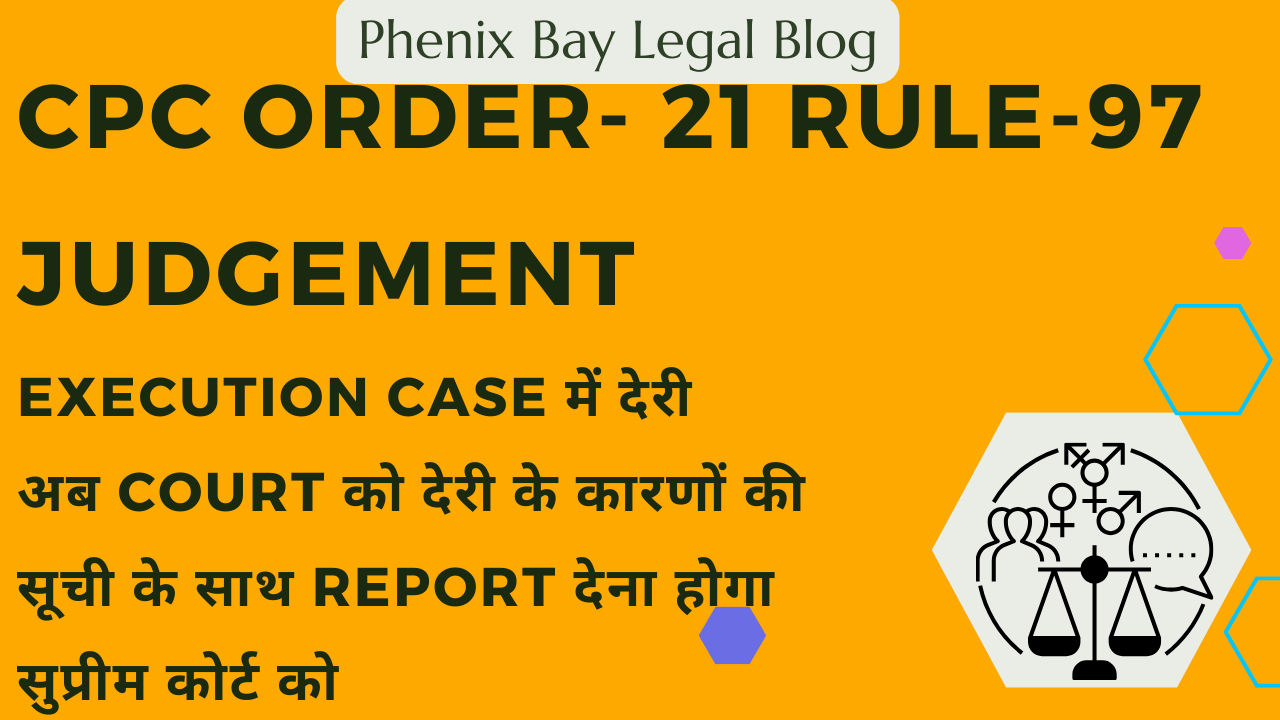
Detailed Case Analysis: Periyammal (Dead) Through LRs & Ors. v. V. Rajamani & Anr.
This case provides important guidance on execution proceedings, third-party resistance, and tenant protection laws. Additionally, the Supreme Court issued significant directions to district courts to ensure smooth execution of decrees.
Detailed Case Analysis: Periyammal (Dead) Through LRs & Ors. v. V. Rajamani & Anr.
(Execution Proceedings & Directions to District Courts)
This case provides important guidance on execution proceedings, third-party resistance, and tenant protection laws. Additionally, the Supreme Court issued significant directions to district courts to ensure smooth execution of decrees.
IN THE SUPREME COURT OF INDIA
CIVIL APPELLATE JURISDICTION
2025 INSC 329
PERIYAMMAL (DEAD) THROUGH LRS & ORS. ... APPELLANTS
VERSUS
- RAJAMANI & ANR. ETC. ... RESPONDENTS
Date; 6.3.2025
- Introduction: Understanding Execution Proceedings & Their Challenges
In civil litigation, obtaining a decree is only half the battle won. The real challenge is executing that decree and ensuring that the decree-holder gets the relief granted by the court. This case illustrates the delays, legal challenges, and procedural loopholes that obstruct execution.
Key Issue in the Case:
- The decree-holder had obtained a decree for specific performance, but when they sought execution, certain persons (respondents) resisted possession, claiming independent tenancy rights.
- The Supreme Court had to decide whether such obstruction by non-parties was legally justified and whether district courts were handling execution proceedings properly.
Legal Question:
- Can third parties obstruct execution even when they were aware of the original suit but did not contest it?
- How should district courts handle resistance in execution to prevent unnecessary delays?
- Factual Background of the Case
- The case arose from a sale agreement dated 30.06.1980 between the plaintiff’s predecessor (Ayyavoo Udayar) and the defendants (vendors).
- The vendors failed to execute the sale deed, leading to a suit for specific performance in 1983.
- The Trial Court (1986) decreed in favor of the plaintiff, directing execution of the sale deed.
- The High Court (2004) and Supreme Court (2006) upheld the decree.
- Execution proceedings were initiated, but possession could not be obtained because respondents (defendants' relatives in possession) resisted execution, claiming they were cultivating tenants.
Supreme Court’s Concern:
- The judgment had been upheld by the highest courts, yet the decree-holder could not enjoy the fruits of the litigation.
- The district courts were not taking effective action to enforce execution and remove resistance.
- Key Legal Issues Examined in the Judgment
Issue 1: Can third parties obstruct execution if they were aware of the original suit but did not contest it?
Relevant Laws & Court’s Analysis
- Section 47 CPC: Execution disputes must be decided within execution proceedings, and separate suits should not be encouraged.
- Order XXI Rule 97 CPC: If a decree-holder faces resistance in execution, the court has the power to remove the obstructionist.
- Order XXI Rule 99 CPC: A third party can claim independent rights only if dispossessed unlawfully, but they must prove genuine legal interest.
🔹 Supreme Court’s Ruling:
- The respondents were aware of the original case but chose not to contest it at that time.
- Instead of participating in the trial, they waited until execution proceedings to challenge the decree.
- The Court held that this was an abuse of the legal process, and the district court should not have entertained such objections.
- Execution proceedings are not meant to re-litigate settled issues.
Conclusion:
- Third-party resistance at the execution stage is not permissible if the party was aware of the case but chose not to intervene earlier.
- District courts must strictly apply Order XXI Rules 97-99 to remove obstructionists.
Issue 2: Can tenant protection laws be misused to obstruct execution?
Legal Framework:
- The Tamil Nadu Cultivating Tenants Protection Act, 1955 protects tenants from eviction without legal process.
- However, tenancy must be established with evidence such as:
- Rental agreements
- Payment receipts
- Official tenancy records
🔹 Court’s Analysis:
- The respondents produced no evidence of tenancy before 2008 (when execution proceedings started).
- The alleged "tenancy rights" were only claimed after execution was initiated—suggesting a deliberate attempt to misuse tenant laws.
- District courts should not allow tenancy claims without clear proof.
Conclusion:
- Tenant protection laws cannot be used as a shield to obstruct execution.
- Courts must strictly scrutinize tenant claims before staying execution.
- Supreme Court’s Directions to District Courts
To prevent delays and misuse of procedural laws, the Supreme Court issued specific directions to district courts for handling execution proceedings.
🔹 Direction 1: Swift Disposal of Execution Petitions
- District courts must not delay execution unless a valid legal objection is raised.
- All objections must be decided within 6 months.
🔹 Direction 2: Avoid Entertaining Unverified Third-Party Claims
- If a third party claims a right over the property at the execution stage, courts must demand strict proof.
- Courts should not entertain claims without strong documentary evidence.
🔹 Direction 3: Proper Application of Order XXI CPC
- Judges handling execution must apply Order XXI Rule 97 strictly to remove obstructionists.
- If resistance is frivolous, the court should impose costs and penalties.
🔹 Direction 4: Accountability of Court Officers
- Court officers and bailiffs must ensure smooth execution without collusion or delays.
- If execution officers fail to perform their duty, courts should take disciplinary action.
Impact of These Directions:
- These measures aim to speed up execution and prevent decree-holders from suffering endless delays.
- Judges must take proactive steps to enforce decrees rather than allowing procedural abuse.
- Key Legal Takeaways from the Judgment
|
Legal Principle |
Supreme Court’s Holding |
|
Execution should not be delayed |
Courts must prioritize decree enforcement. |
|
Third-party claims must be scrutinized |
Unverified claims cannot halt execution. |
|
Tenant protection laws require evidence |
Claims made after execution begins should be treated with suspicion. |
|
District courts must act proactively |
Execution must be completed within 6 months wherever possible. |
|
Judicial officers are accountable |
Officers failing to execute decrees should face disciplinary action. |
- Practical Implications for Law Students & Legal Practitioners
🔹 Lessons for Lawyers & Litigants
✅ Raise all objections at the trial stage—objections at execution are discouraged.
✅ Ensure strong documentary evidence before claiming tenancy rights.
✅ Use Order XXI CPC effectively—know the legal tools to remove obstructionists.
✅ Push for fast execution—avoid unnecessary delays in getting court orders implemented.
🔹 Lessons for District Court Judges
✅ Execution should not be treated as a formality—strict action should be taken against delays.
✅ Resist entertaining frivolous third-party claims.
✅ Apply costs & penalties on obstructionists.
Here is a list of case laws mentioned in the Supreme Court judgment along with short notes on each case to help you understand their relevance in the Periyammal (Dead) Through LRs & Ors. v. V. Rajamani & Anr. case.
Case Laws Cited in the Judgment
- Brahmdeo Chaudhary v. Rishikesh Prasad Jaiswal (1997) 3 SCC 697
Legal Principle:
- Third-party resistance in execution proceedings must be decided under Order XXI Rule 97 CPC.
- A third party does not need to file a separate suit to assert possession rights.
- The executing court must adjudicate the third party’s claim before removing them.
Relevance to Periyammal Case:
- In Periyammal, the respondents (third parties) objected to execution without having contested the main suit.
- The Supreme Court ruled that Order XXI Rule 97 should be applied strictly, and objections should not be entertained unless well-founded.
- Shreenath v. Rajesh (1998) 4 SCC 543
Legal Principle:
- Order XXI CPC should be interpreted in a manner that prevents execution delays.
- The court has the inherent power to remove unlawful obstructions in execution.
- Frivolous resistance should not be allowed to defeat the decree-holder’s rights.
Relevance to Periyammal Case:
- The respondents in Periyammal’s case tried to delay execution by falsely claiming tenancy rights.
- The Supreme Court reaffirmed Shreenath’s principle that courts should not allow baseless objections to stall execution.
- Silverline Forum Pvt. Ltd. v. Rajiv Trust & Anr. (1998) 3 SCC 723
Legal Principle:
- A person in possession can resist execution but must show a legitimate right over the property.
- If they fail to prove a valid claim, their resistance should be dismissed.
Relevance to Periyammal Case:
- The respondents failed to prove that they were legitimate cultivating tenants.
- The Supreme Court applied Silverline Forum and held that unsubstantiated possession claims should not block execution.
- Ashan Devi v. Phulwasi Devi (2003) 12 SCC 219
Legal Principle:
- The executing court cannot go behind the decree; its role is to implement the judgment.
- If a third party resists execution, their claim must be adjudicated properly under Order XXI Rule 97.
Relevance to Periyammal Case:
- The respondents were trying to re-litigate an issue already decided in the main case.
- The Supreme Court relied on Ashan Devi to state that execution proceedings cannot be turned into a fresh trial.
- Babulal v. Raj Kumar (1996) 8 SCC 770
Legal Principle:
- A decree must be executed in its true spirit—it should not be delayed on procedural grounds.
- The executing court must implement the decree as it stands, without modification.
Relevance to Periyammal Case:
- The district court had delayed execution instead of ensuring compliance with the decree.
- The Supreme Court ruled that such delays go against the principle laid down in Babulal.
- U.N. Krishnamurthy v. A.M. Krishnamurthy (2022) 1 SCC 578
Legal Principle:
- Execution proceedings must be concluded within a reasonable time.
- Courts should not entertain stale claims or obstruct execution without substantial grounds.
Relevance to Periyammal Case:
- The Supreme Court emphasized that execution cannot be prolonged indefinitely, citing U.N. Krishnamurthy.
- Since the respondents did not contest the original suit, their resistance at the execution stage was improper.
- K.K. Verma v. Union of India AIR 1954 SC 1092
Legal Principle:
- The mere existence of possession does not create tenancy rights.
- A tenant must prove legal tenancy through documents or rental payments.
Relevance to Periyammal Case:
- The respondents claimed tenancy rights under the Tamil Nadu Cultivating Tenants’ Protection Act.
- However, since they had no proof of tenancy, the court relied on K.K. Verma to reject their claims.
- K.K. Modi v. K.N. Modi & Ors. (1998) 3 SCC 573
Legal Principle:
- Litigation should not be misused to delay legitimate court orders.
- Courts have the power to prevent abuse of legal procedures.
Relevance to Periyammal Case:
- The respondents tried to misuse tenant protection laws to block execution.
- The Supreme Court followed K.K. Modi in ruling that such tactics should be strictly discouraged.
- Vidyadhar v. Manikrao & Anr. (1999) 3 SCC 573
Legal Principle:
- A party who does not challenge a claim at trial cannot raise new objections in execution.
Relevance to Periyammal Case:
- The respondents did not contest the original suit but later objected in execution.
- The Supreme Court ruled that their objections were barred under Vidyadhar.
Final Summary of Case Laws & Their Impact on Periyammal Judgment
|
Case Name |
Key Legal Principle |
Applied in Periyammal Case |
|
Brahmdeo Chaudhary (1997) |
Third-party objections must be resolved under Order XXI Rule 97. |
The Supreme Court ruled that execution cannot be stalled by non-parties. |
|
Shreenath (1998) |
Courts must ensure execution is not delayed. |
The Supreme Court directed district courts to act swiftly. |
|
Silverline Forum (1998) |
Possession claims must be legitimate. |
The respondents failed to prove tenancy. |
|
Ashan Devi (2003) |
Execution courts must follow the decree. |
The Supreme Court ruled that execution should proceed without unnecessary hearings. |
|
Babulal (1996) |
Execution must be enforced without delay. |
The Supreme Court criticized the district court’s slow handling. |
|
U.N. Krishnamurthy (2022) |
Execution proceedings should be concluded quickly. |
The Supreme Court set a 6-month timeline for completion. |
|
K.K. Verma (1954) |
Possession does not automatically mean tenancy. |
The Supreme Court rejected false tenancy claims. |
|
K.K. Modi (1998) |
Courts must prevent abuse of legal process. |
The Supreme Court ruled that the respondents were misusing legal provisions. |
|
Vidyadhar (1999) |
Issues not raised in trial cannot be raised in execution. |
The respondents were barred from objecting at the execution stage. |
- Conclusion
The Supreme Court in Periyammal v. Rajamani has laid down an important precedent to prevent the misuse of legal procedures in execution proceedings.
Final Summary of the Judgment:
- Execution proceedings should be swift—courts must not allow unjustified delays.
- Tenant protection claims must be examined carefully—courts must ensure they are not being misused.
- District courts must actively enforce decrees and prevent obstructionists from delaying execution.
- Judges and court officers must be accountable—failure to execute a decree can lead to disciplinary action.
Judgement Link - https://indiankanoon.org/doc/160800474/
#phenixbaylegalblogs #supremecourtjudgementanalysis #executioncasedetails #phenixbaylegalformats #india #indiatier1cities #judiciaryprepartion
More >>

Jyoti Sharma vs. Vishnu Goyal & Anr. 2025 INSC 1099
This was a long running legal battle between a landlord and her tenants over a shop. The landlord, Jyoti Sharma, wanted her shop back for two main reasons: The tenants had stopped paying rent. She needed the shop to expand her family's business (her bonafide need).
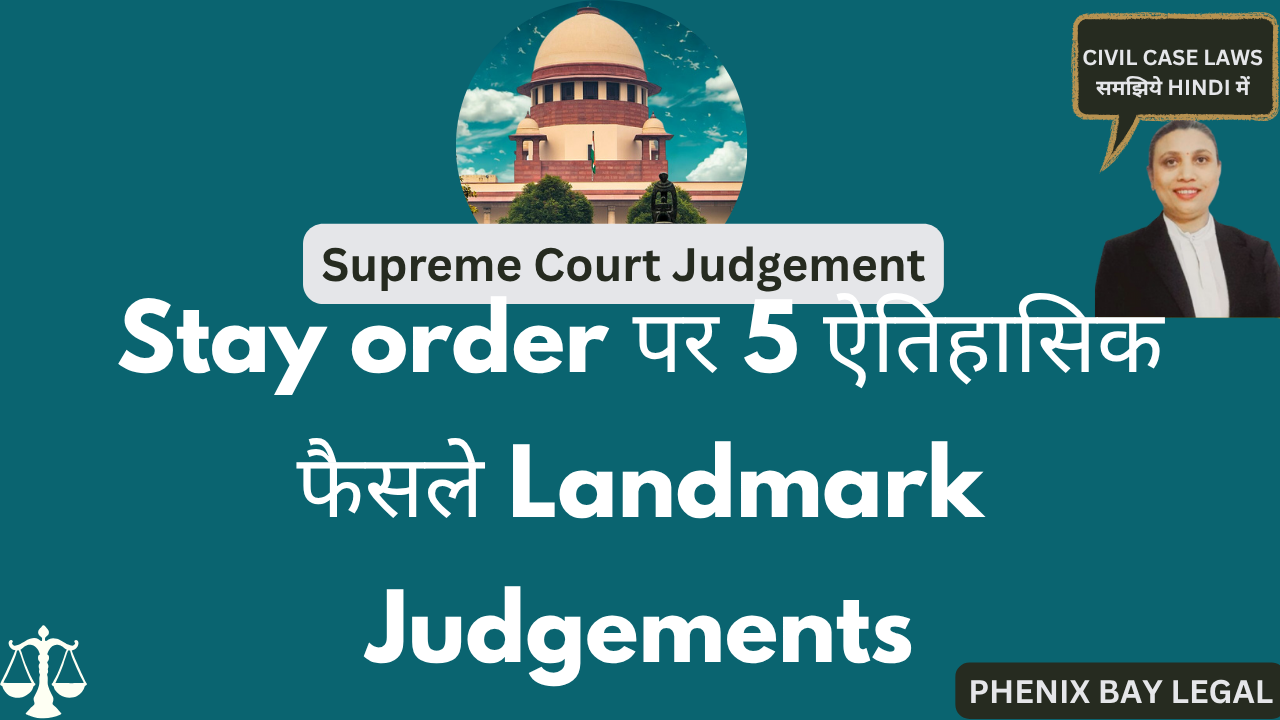
Landmark Judgement on Injunction
In civil, commercial, or even family disputes. But when is a simple injunction suit enough? When do you need to add a declaration of title? And how do courts balance urgency vs evidence in interim relief?
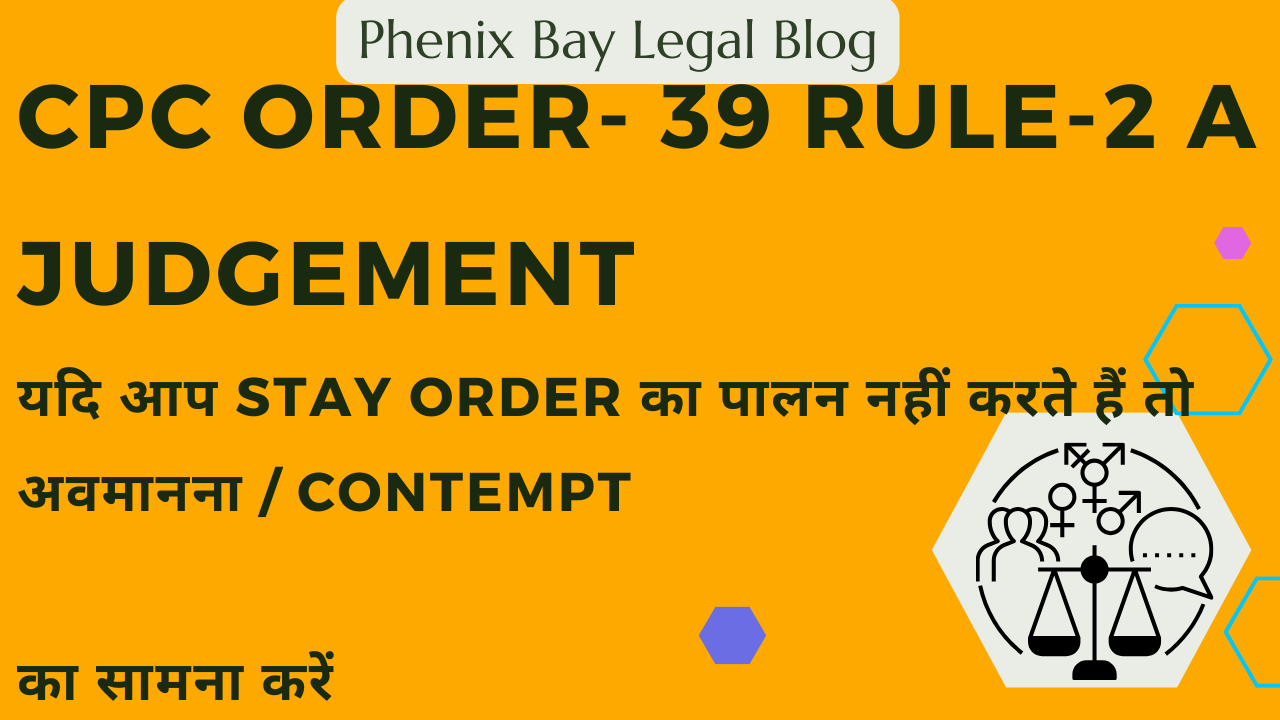
Case Analysis: Stay Order Violation and Contempt of Court by Supreme Court of India
Giving an undertaking to the court is equivalent to an order of injunction—any violation invites contempt proceedings.Injunction orders remain valid until formally vacated by a court—violation before vacation can lead to punishment.
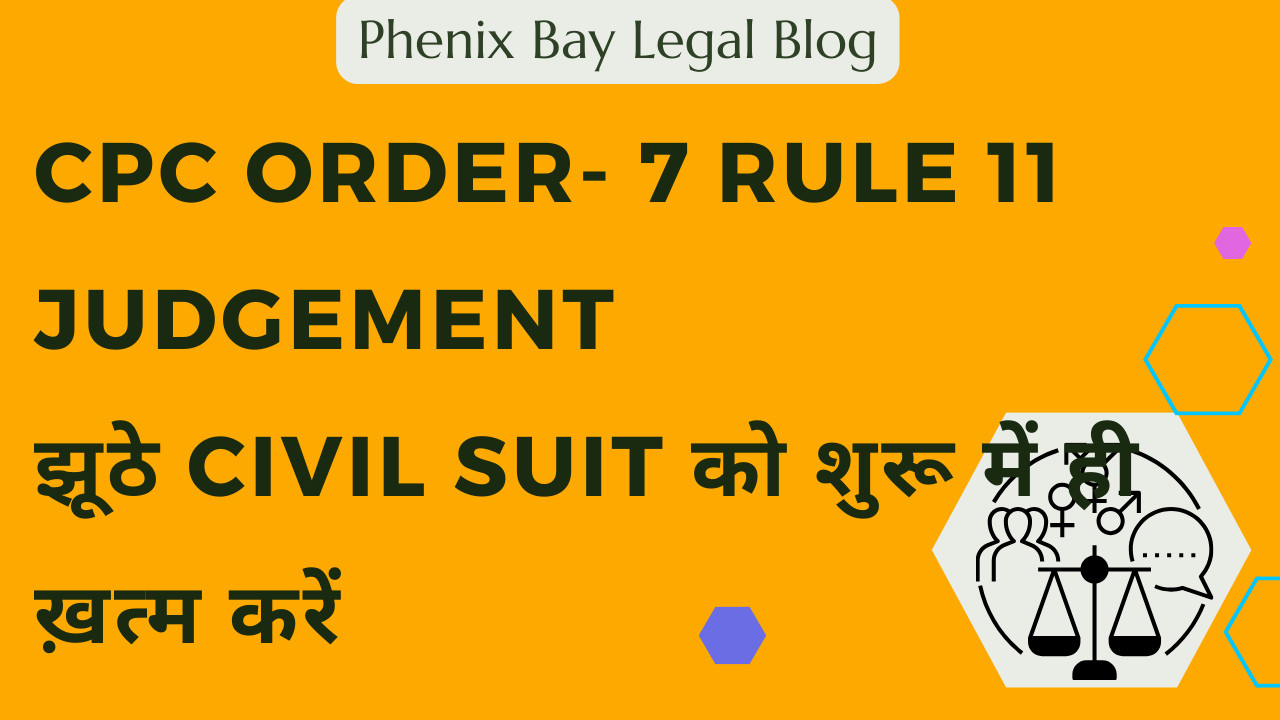
Order 7 Rule 11 of CPC Explanation in Land Mark Judgement
The Sopan Sukhdeo Sable judgment is a landmark ruling that reinforces Order 7 Rule 11 of CPC as a safeguard against frivolous and legally untenable claims. It highlights the importance of examining only the plaint’s contents to decide whether a suit should be dismissed at the threshold.
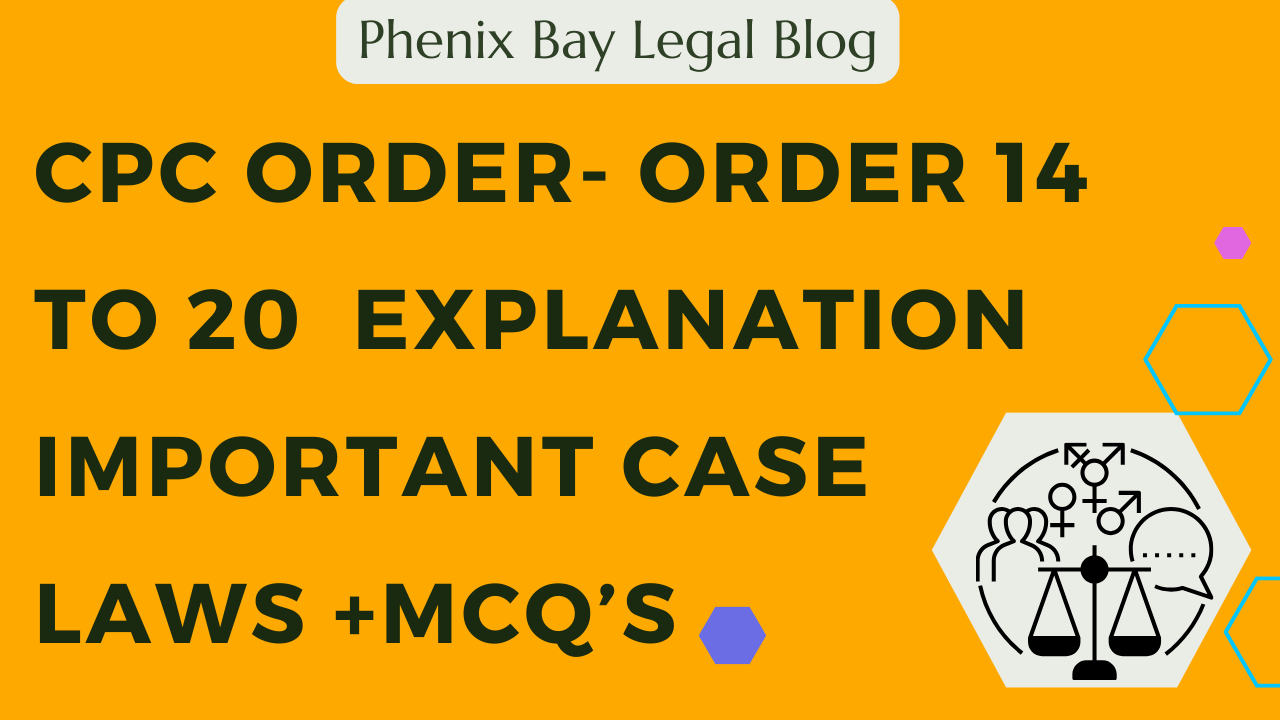
CPC Order- Order 14 to 20 Explanation IMPORTANT CASE LAWS +MCQ’S for Judiciary Exam Preparation
CPC Order- Order 14 to 20 Explanation IMPORTANT CASE LAWS +MCQ’S for Judiciary Exam Preparation
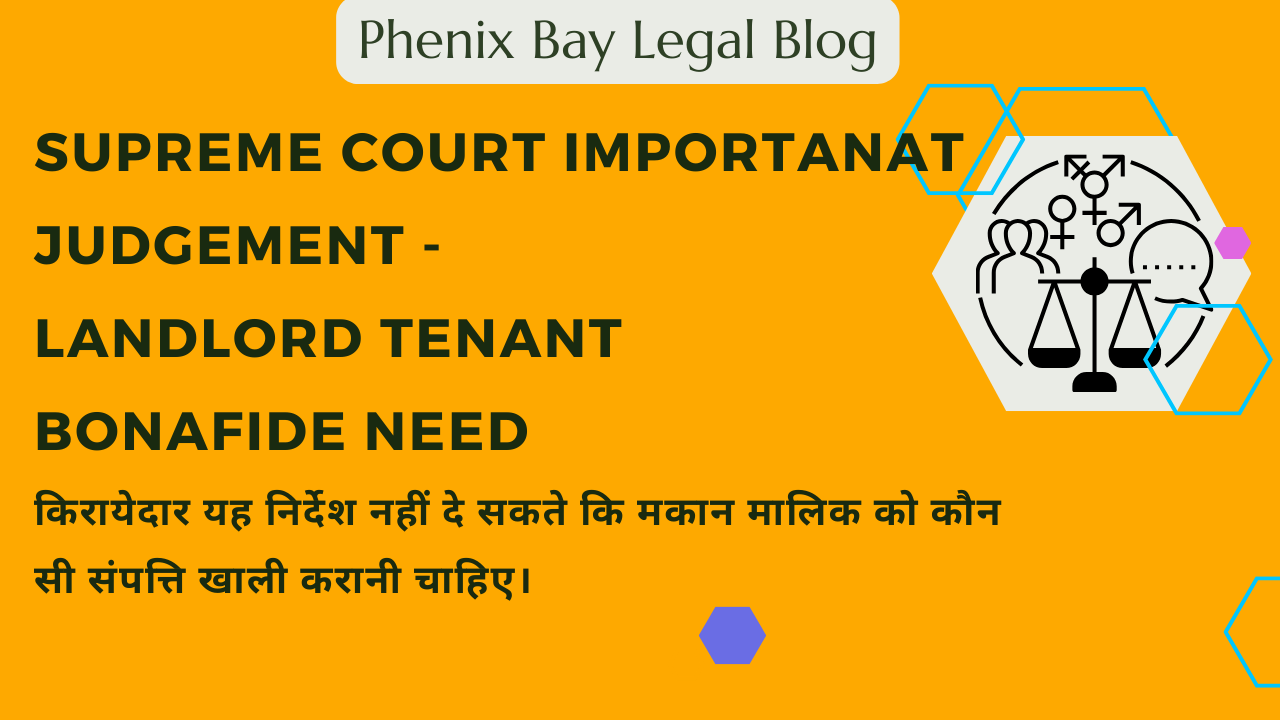
Supreme Court ImportanatJudgement - Landlord Tenant Bonafide need
This case involves a dispute over eviction of a tenant based on the bona fide need of the landlord. The Supreme Court ruled in favor of the landlord, reversing the High Court's decision. Below is a detailed breakdown of the judgment with relevant legal principles, precedents, and reasoning.